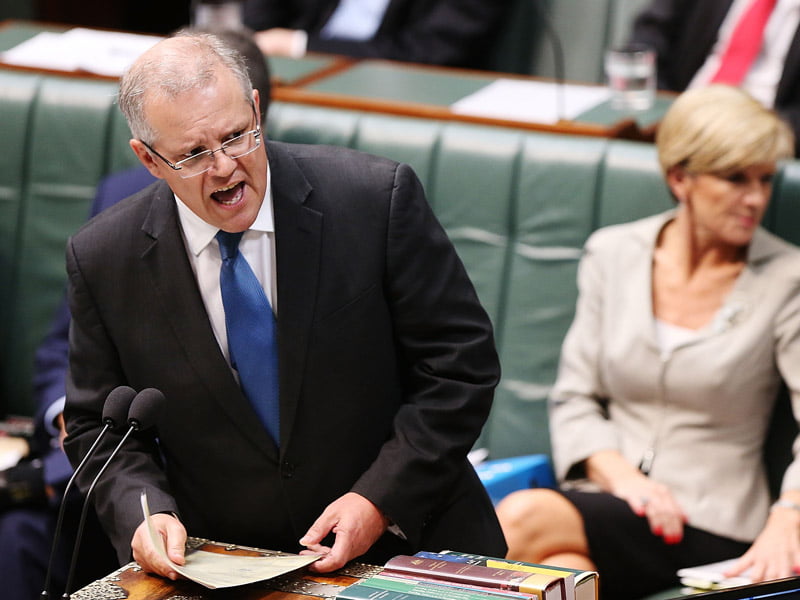The government response to David Murray’s Financial System Inquiry was an awfully long time in coming. Its cross-the-board acceptance of the vast majority of its recommendations is welcome (and makes you wonder what the hold-up could possibly have been?)
But you also get the sense from both the Prime Minister and from Treasurer Scott Morrison that there is unfinished business here. That more is to come.
From an innovation perspective, you would have to hope so. To generalise, the Murray inquiry provided a roadmap for tightening up our existing system, with measures to improve efficiency and competition.

It has tightened up the traditional systems. It had much less to say about the army of innovators that are applying new technology and new thinking to the financial system.
So while Malcolm Turnbull and the economic leadership team are being congratulated for getting the official response out there, the government Innovation Statement expected before the end of the year will almost certainly carry additional measures for FinTech.
There is interesting reading in the FSI response document. It clearly gets the opportunity, and understands where government can pull levers to improve
“New payment methods, innovative funding sources, better use of customer information and deeper cross-border linkages promise enormous opportunities, if properly harnessed.”
“Our policy settings must facilitate entry of these disrupters rather than acting as a blockage.”
Among its initiatives is planning for improved digital identity, which should allow both public and private sector bodies to compete for identity services (which is itself a fascinating idea.) It also points to work already being done to facilitate region-wide identity. This is a longer-term objective, but smart thinking, clearly.
By the middle of next year, the government will have also created an Innovation Collaboration Committee made up of public sector and private sector representatives.
It is a fair bet that State governments will want to be a part of this – NSW for sure – and that we will hear more about its composition and ambition as part of the Turnbull Government Innovation Statement.
There is also a roadmap for creating “technology neutrality” across the system.
The FSI response was well received. Who doesn’t like improved consumer protections? Or mechanisms to ensure the ongoing robustness of the whole system?
But ultimately it was pretty underwhelming for FinTech innovators in Australia – primarily in Sydney – who are doing cool stuff to strip inefficiencies out of the current system.
RateSetter chief executive Daniel Foggo says the inquiry and its response so far is a bit of a missed opportunity. Of course it is all very well to look after the health of the mainstream sector – but probably not enough emphasis was put on the emerging players.
The FSI response probably underplays the accelerated pace of change the industry undergo in the next several years, and the opportunities and challenges for Australia that these changes present.
RateSetter is a peer-to-peer lender, set up by Mr Foggo as an offshoot of the UK-based company of the same name – but with investors like carsales.com.au and Stratton Finance among its shareholders.
The company set up in 2012, but after a lengthy process of engagement with regulators, launched the actual business in November last year. It has provided $13 million in loans in that first 12 months and now employs 22 people.
Mr Foggo says the RateSetter loan numbers don’t fully reveal the company’s exponential growth. It will loan $100 million in its second year.
He welcomed the creation of an Innovation Collaboration committee, and its aim to include private sector players. But by linking the committee to ASIC’s Digital Finance Advisory Committee, there is a risk that it only look at regulatory issues, a small piece of the puzzle.
Mr Foggo points to the bigger lever that government can pull in FinTech – participation. The UK Government, for example, is investing sovereign funds through P2P lenders. It’s small beer in the scheme of things, but the investment provides an incredibly important marker, as an endorsement for the legitimacy of these new FinTech platforms.
The other area is Comprehensive Credit Reporting. If there is a single thing government can do to spur competition in financial markets, it would be the creation of an open platform for credit history data. Australia remains one of the only developed economies where this information is not shared as routine.
“You would have thought that in such a massive refresh of the financial system, that some of these issues [that relate to non-traditional finance models] would be a focus,” Mr Foggo said.
Prospa joint CEO Greg Moshal says there are a range regulatory and policy initiatives that could be directed at the FinTech sector to accelerate its growth. The FSI response is a good start, but its primary focus on traditional providers misses the mark.
Australia has an active FinTech development scene, but the space is moving very quickly. Australia can be a genuine leader here – and extend the health of its financial services market as a hub in the region – but it will take a focus on the non-traditional lenders to achieve this.
For Prospa, which is headquartered in Sydney and is one of Australia’s fastest growing tech companies (it was founded four years ago and now employs 70 people), government participation – as happens in the UK – is key.
“Helping legitimise the space by working with FinTech’s, by participating in funding and essentially demonstrating the legitimacy of the sector … that’s really important,” Mr Moshal said.
*Photo Credit: Getty
Do you know more? Contact James Riley via Email.

